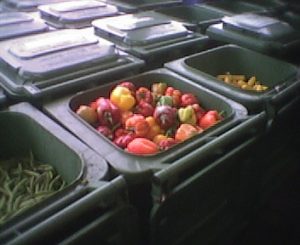| Average Australian home | $1100 a year |
|---|---|
| Smart renter | $0 or almost $0 |
| Very smart renter | $0 or almost $0 |
Food is an important part of any culture. Its variety, flavours and nutrients are vital to life, yet Australians throw out on average, one out of every five bags of groceries bought home [1]. You can easily drop 10% off your food bills by following these 10 simple tips:
- Check the fridge and pantry before going shopping to see what you already have and if anything is getting close to perishing.
- Practice good rotation when buying groceries by putting the oldest stock at the front to be used first and the newest at the back.
- Fresh produce tends to be wasted the most, so buy more frequently in smaller amounts to avoid spoilage.
- Know how to store your foods and how long groceries should keep. For example, some fruit and vegetables don’t store well in the fridge and dry goods are best stored in airtight containers.
- Trust your nose and instincts; something a day past its use by or best before date can still be used in most cases if it looks, smells and tastes ok.
- Older foods can sometimes be used in another way: Older vegetables can be used in soups, old fruit can still be used with the bad bits cut off and stewed and stale bread is fine for croutons.
- Cook what you need to avoid masses of leftovers. Refrigerated leftovers should keep for a few days whilst frozen leftovers can keep for months.
- Speaking of leftovers, they can be combined with a few other ingredients to make a new meal whilst saving time, effort and money.
- Grow your own herbs and salad greens so you can pick what you need instead of buying a whole bunch, most of which is likely to slowly compost at the back of your fridge.
- If something does go off, compost it or at least put it in the green waste bin if your council composts food waste.
Even if $1100 a year doesn’t seem like a big deal…

- One third of the world’s food grown is lost or thrown out which is four times the food needed to feed the world’s undernourished [2].
- Food waste contributes to 8% of global warming, in fact if it were a nation, it would be the world’s third biggest emitter after China and the US [3].
- In Australia, around half of food waste occurs at the customers end meaning we can actually do a lot to solve this problem even at home [4].
- Organisations like Oz Harvest are working to minimise food waste at a supermarket/supply chain level while some supermarkets are now selling wonky carrots and the like at a reduced price instead of throwing them out.
Food waste doesn’t need to be an unnecessary drain on your wallet or the environment by following the above 10 simple tips. It also beats cleaning spoiled food out of the fridge or pantry.
Further Reading:
[1] https://www.smh.com.au/business/consumer-affairs/sydney-households-spend-an-average-of-163-a-week-on-groceries-20160921-grlcos.html [2] https://www.ozharvest.org/what-we-do/environment-facts/ [3] https://www.unenvironment.org/regions/north-america/regional-initiatives/minimizing-food-waste [4] https://theconversation.com/melbourne-wastes-200-kg-of-food-per-person-a-year-its-time-to-get-serious-60236